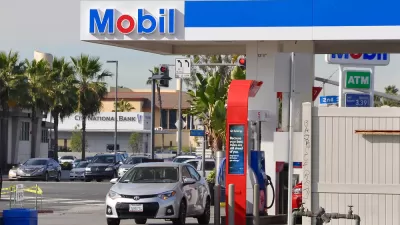Over the weekend, Virginia passed a controversial transportation funding plan that replaces the state's gas tax with a combination of revenue streams. Two California economists look at the flaws with the plan.
Although Virginia Gov. Robert F. McDonnell’s original plan to replace the state’s gas tax with a 16 percent increase in sales taxes didn't fly, the state's legislators have approved a comprose bill that reaches similar ends and some believe "may be even worse."
Fredrick Kunkle and Laura Vozzella break down the final agreement: "The new plan [replaces] the 17.5 cents-per-gallon tax on gasoline — which had not been changed since 1987 — with a new 3.5 percent wholesale tax on motor fuels that will keep pace with economic growth and inflation."
"The deal’s major components also include boosting the sales tax on nonfood merchandise from 5 percent to 5.3 percent and devoting a fatter slice of existing revenue to transportation instead of schools, public safety and other services. And it creates a regional funding mechanism that boosts the sales tax to 6 percent in Northern Virginia and Hampton Roads and requires those funds to be spent only on transportation projects in those areas."
"Supporters praised the plan to raise about $880 million a year, including the new dedicated streams of money for mass transit," add Kunkle and Vozzella, "while opponents spoke out against taxing different parts of the state at different rates or doubling the registration fee on electric cars to $100 and applying it to alternative fuel and hybrid vehicles, too."
In an editorial in The Washington Post, economists Michael Madowitz and Kevin Noonan argue that removing the fixed tax on gasoline at the pump will cause Virginia's transportation revenue to fluctuate drastically.
"Virginia would be best served by an approach that asks people to pay for what they use, assumes inflation will occur and accepts that transportation infrastructure costs money. To do that, all that was needed was indexing the per-gallon gas tax to inflation," they write.
Having studied the effects of a similar approach in California, which experienced a 12 percent fluctuation in revenue difference, Madowitz and Noonan believe the state could have generated a steadier and more predictable revenue stream by taxing motorists at the pump according to inflation.
FULL STORY: Virginia lawmakers approve sweeping transportation plan

Maui's Vacation Rental Debate Turns Ugly
Verbal attacks, misinformation campaigns and fistfights plague a high-stakes debate to convert thousands of vacation rentals into long-term housing.

Planetizen Federal Action Tracker
A weekly monitor of how Trump’s orders and actions are impacting planners and planning in America.

In Urban Planning, AI Prompting Could be the New Design Thinking
Creativity has long been key to great urban design. What if we see AI as our new creative partner?

King County Supportive Housing Program Offers Hope for Unhoused Residents
The county is taking a ‘Housing First’ approach that prioritizes getting people into housing, then offering wraparound supportive services.

Researchers Use AI to Get Clearer Picture of US Housing
Analysts are using artificial intelligence to supercharge their research by allowing them to comb through data faster. Though these AI tools can be error prone, they save time and housing researchers are optimistic about the future.

Making Shared Micromobility More Inclusive
Cities and shared mobility system operators can do more to include people with disabilities in planning and operations, per a new report.
Urban Design for Planners 1: Software Tools
This six-course series explores essential urban design concepts using open source software and equips planners with the tools they need to participate fully in the urban design process.
Planning for Universal Design
Learn the tools for implementing Universal Design in planning regulations.
planning NEXT
Appalachian Highlands Housing Partners
Mpact (founded as Rail~Volution)
City of Camden Redevelopment Agency
City of Astoria
City of Portland
City of Laramie



























